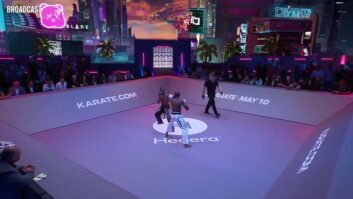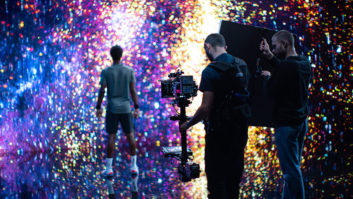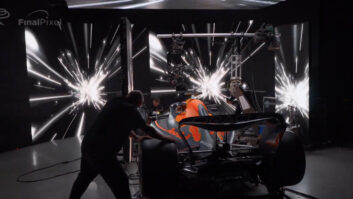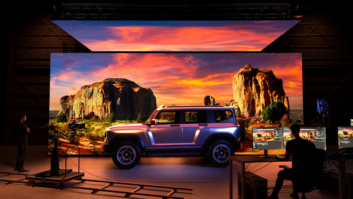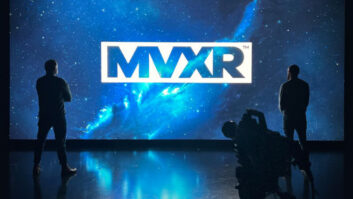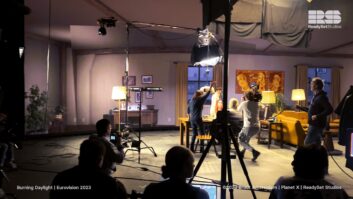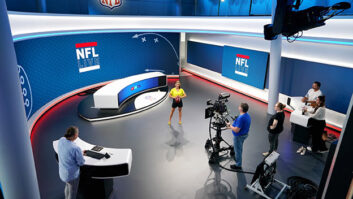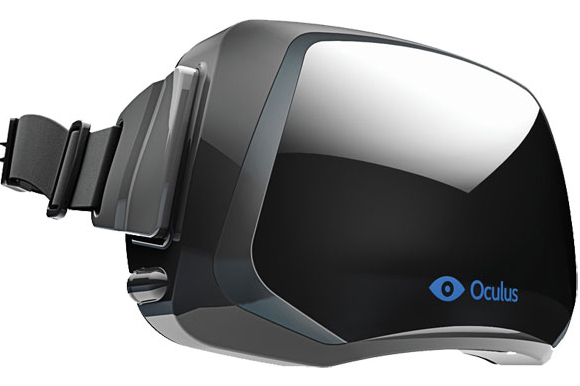
Atlantic Productions is producing a series of virtual reality narrative pilots for Facebook’s virtual reality headgear maker Oculus Rift and for Sony’s Project Morpheus among others.
“VR will be a game-changer,” said Anthony Geffen, CEO and creative director of Atlantic Productions. “The point of entry [for consumers] is cheaper than a mobile phone and content distribution will be global. VR is known for gaming, but what it needs is quality narrative content and that’s where we come in.”
Facebook acquired Oculus Rift in March for $2 billion and is anticipated to start selling a consumer product later this year costing around $350 each. One of Atlantic’s 10-minute long VR programmes could be bundled with its release.
Atlantic, a major producer of 3D TV natural history documentaries in joint venture with Sky and under the Colossus banner, said it began VR development six months ago and has partnered with several virtual reality firms to create content.
Material for one project was shot at the same time, but separately to, a forthcoming 3D 4K documentary: Conquest of the Skies. The live action project will be fronted by Sir David Attenborough.
Another project is being created in CGI at Atlantic’s own visual effects division, Zoo.
The producer is also playing around with narrative drama and has a pilot in discussion “with one of the main manufacturers”.
“This is more like a 10-minute experience rather than a 30-minute episode,” Geffen explained. “There is a need for new content formats with virtual reality.”
A variety of shooting techniques have been used. These include the use of rigs with six or eight GoPro cameras. Geffen said Atlantic is also about to launch into shooting VR content in 4K.
Audio has been reproduced binaurally, a technique that simulates the way the human body responds to sound and gives the illusion of being in a particular place. Headphones are needed for playback.
“There are a whole range of potential new shots that are not possible on conventional 16×9 TV screens,” said Geffen. “Do you focus on 360º or on immersive 3D or on a huge 180º shot? All these are now feasible. We are at a stage of imaging history where the rules are being rewritten.”
One conundrum the producer says it has solved is where to place the on-screen presenter in a 360º panorama when they will always be in shot. Other issues include how – or indeed whether – to make any edits.
The producers are also keen to explore 360º video in stereo 3D, although they say there is no system yet capable of producing it efficiently.
To do all of this, Atlantic is hosting everything from R&D and rig development, to filming, VFX and post production entirely in-house and admits that the effort is extremely challenging.
“There is not really a clear system in place for post producing VR content,” said Phil Harper, head of Atlantic Digital. “We began by manually stitching six videos from the six cameras and processing them into one. Then we’d have to regrade to remove the stitching effect, again a very manual process. Software development is changing fast to make the process easier, but there are big questions concerning format, bitrate and frame rate. For example, what frame rate should we be shooting in and how do we play back at the correct frame rate?”
Geffen said: “We had to create our own digital VR department and this is now a full time operation. We’re in production and developing all our own processes from concept to shoot. I still believe in 3D but a big problem was that the industry was very slow to give audiences a reason to understand why 3D is amazing. The content simply wasn’t there. Virtual reality is totally immersive and it could be a massive mainstream entertainment experience.”
In a conference call announcing its acquisition of OR, Facebook CEO Mark Zuckerberg said: “We’re making a long term bet that immersive virtual and augmented reality will become a part of people’s daily lives.”
He claimed that Oculus has the potential to be the “most social platform ever.”
Sceptics find it hard to understand just where social reality meets virtual reality. “Transforming Oculus into a device that connects multiple people is a tremendous technical challenge, and even if you can meet that challenge, that doesn’t mean people will be comfortable using the thing,” said Gartner analyst Brian Blau.
Zuckerberg explained that while 40% of the time spent on the internet is on social networking, 40% is spent playing games and that Facebook’s plan is to “fuse both of those together”.
Already in the UK, mobile operator O2 has begun experimenting with OR to offer fans a chance to go behind the scenes with the England Rugby team on match days. Creative agency Figure Digital has also created a 360º virtual store for Tesco.
